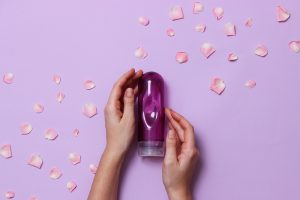
Do you use lube? Not only can it be fun to use but it’s also important for safer sex! Yep, using lube can not only help things go smoother but it can help prevent irritation, tearing, and infection. But, it’s important to find the right lube for you. Many lubes have toxic chemicals that aren’t meant for our delicate genital area. In this episode, we talk about the different types of lubes, what works well for different purposes, and how to avoid lubes that aren’t safe for your body.
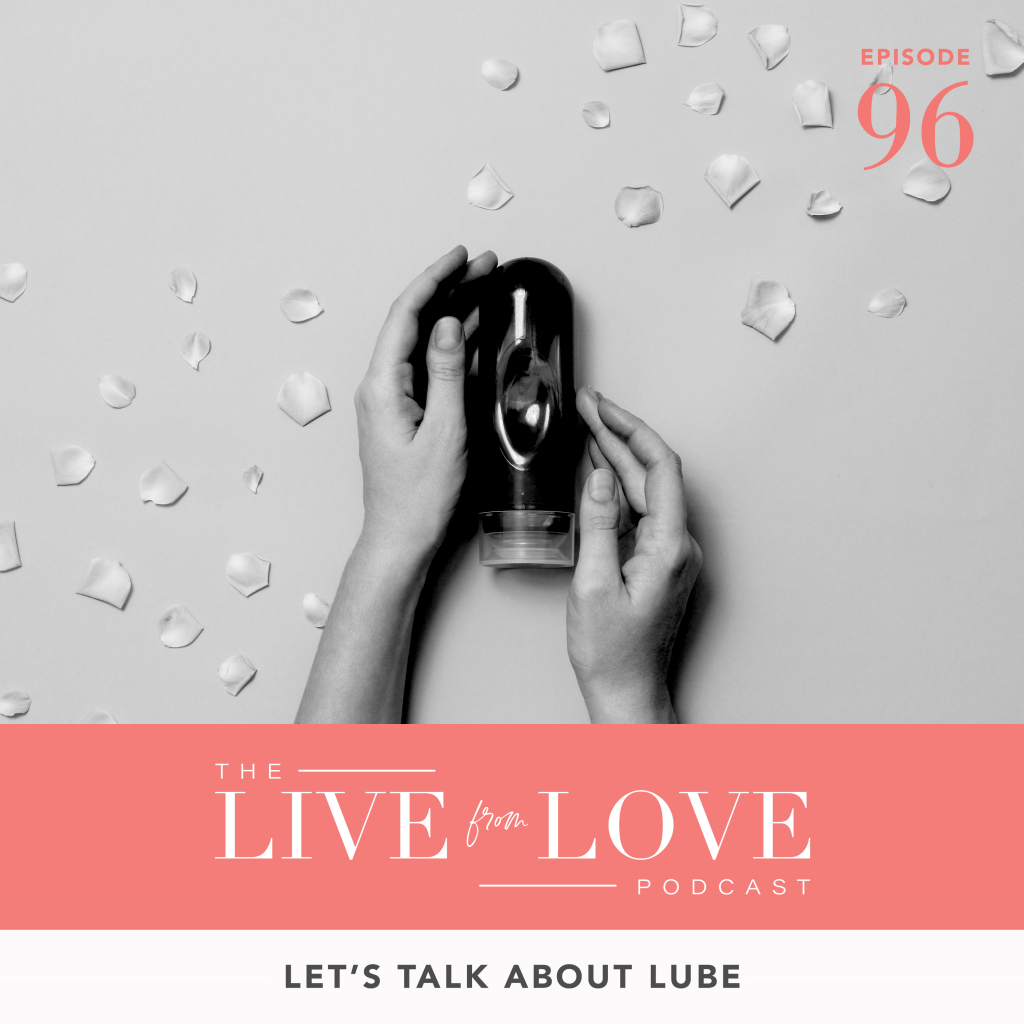


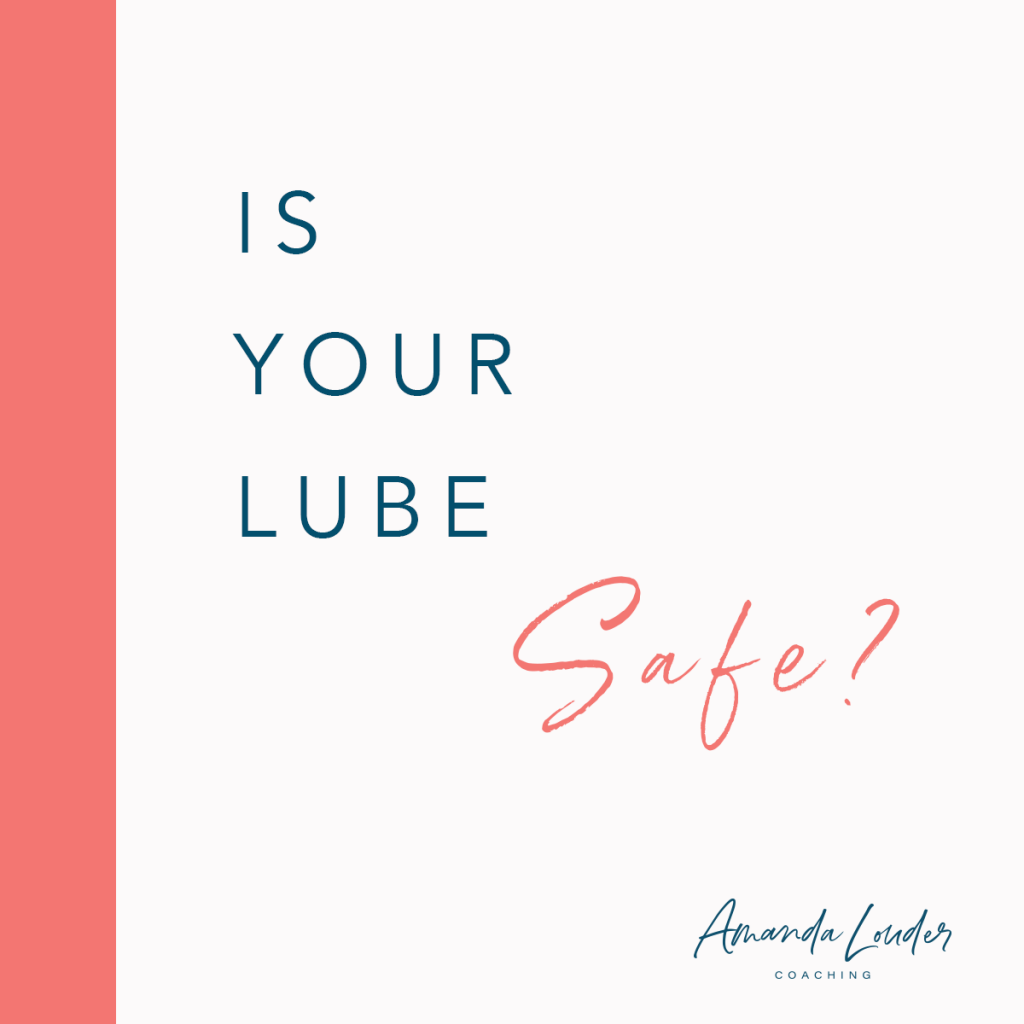
Show Notes:
Follow Amanda on Facebook and Instagram.
Join Amanda’s Private Facebook Group.
References for this episode:
https://badvibesdotorg.files.wordpress.com/2015/12/lube-guide-every-body-edition.pdf
http://www.hopesandfears.com/hopes/now/question/214049-lube-question
https://www.aasect.org/what-you-need-know-about-personal-lubricants
Show Summary:
I’m excited to talk to you today about an important topic that often gets overlooked. Lube! Now, I am no expert, by any means, but I have done some research and gathered information from reputable sources on lube that I am sharing with you today. I encourage you to do your own research and find what works best for you.
Natural Lubrication
Vaginal tissue is naturally moist. Fluid from the cervix and secretions from Bartholin’s glands (which are two glands located just on the outside of the vaginal opening) keep the vagina lubricated. Production of fluid increases significantly near ovulation and during sexual arousal in anticipation of intercourse.
For women, vaginal lubrication is an important part of sexual arousal. It readies the vagina for penetration, making it easier for the penis to enter and reduce any accompanying friction or irritation. Pain during intercourse is often caused by inadequate lubrication.
There is a myth that additional lube is only needed when there is a problem. There are also incorrect assumptions that younger women do not need to use lubrication because they should be able to lubricate just fine on their own. Ask just about any young bride with an over-eager groom on her wedding night how that worked out for her.
It is pretty common, even in healthy young women, for the vagina not to produce sufficient lubrication. Some common reasons are:
- Medications like contraceptives, anti-depressants, and allergy medications
- Changes in hormone levels due to contraception, pregnancy, breastfeeding, menstruation, or after childbirth
- Menopause
- Dehydration
- Stress, anxiety, and relationship issues
- Chemical products – washing powders, harsh soaps, feminine sprays, douches, or perfumed toilet paper.
- Lack of foreplay
Why do we need lube?
A 2013 study of 2,451 women aged between 18-68 found that overall, women felt positive about lubricants, preferring sex to feel more wet than not. 9 out of 10 women felt that sex was more comfortable, pleasurable and simply better when using lubrication.
It can also make sex feel pleasurable for men too. Having a well-lubricated penis not only enhances pleasure but it can also make sexual intercourse last longer.
One of the best reasons for using lube is to prevent damage or abrasion to the delicate tissues of the vagina, penis, and anus. The vagina and anus are lined with mucous membranes, much like the inside of the mouth and nose. This tissue is very sensitive and can tear easily. Without proper lubrication, the the delicate tissues can get micro-tears that can cause pain, irritation, and be more susceptible to infection.
Lube
So, now we know WHY we need lube, what lube should we use? When you were getting married you may have been informed by your friends to get some lube from the local pharmacy or grocery store before your wedding night. While the advice for lube is great – I want to caution you to do your research and not just use something from the grocery store because it is convenient. Many lubes (especially well known brands) are full of toxic chemicals that you really don’t want in your body. And this isn’t done maliciously, it’s just more of an oversight. They include ingredients that aren’t formulated for the delicate tissue and membranes in the genitals and keeping the genital microbiome healthy. They just haven’t been well vetted. Luckily, there are some great people doing research to vett these products and there are some great companies making lube that is safe and non-toxic.
I was talking about this issue in a Facebook group I was in and got quite a bit of pushback from one person in particular. She just couldn’t fathom that anything from the grocery store could be harmful. She argued that they wouldn’t be able to sell it otherwise. But that just isn’t the case.
When a lubricant puts on its packaging that it “relieves vaginal dryness” that is technically a medical claim and now that lubricant has to be regulated by the FDA as a medical device instead of a drug. But because it’s regulated as a medical device, it no longer has to list its ingredients on the package. So companies can pretty much put whatever they want in them. So, I would highly recommend that you do your research and find a lube that is natural and safe to put in your body. Really, you want something that you can safely eat. Now, I wouldn’t recommend going around eating lube, but it should be safe enough to do that if you were to ingest it on accident. Even suntan lotions are FDA regulated as a drug and they don’t end up inside the body like lubricants.
One of the reasons why I wanted to do this episode is because I hear about many women who have irritation, itching, and even repeated infections and we often don’t even think that it might be coming from our lube. So it’s just a really good idea to be aware of this. To know and understand what we are putting on and in our bodies. And if you are experiencing any of these symptoms, lube might be something that you look at changing.
What Kind of Lube should I use?
When choosing a lube, there is no RIGHT choice. You have to choose the right one for the right activity. There are basically 4 types of lube.
- Water based
- Oil based
- Silicone based
- Hybrid (Silicone & Water)
You can find safe, non-toxic lubes for all four types.
Water based lube
You’ll have the most options with a water-based lube. It’s usually the most affordable and is compatible with safer sex barrier methods, like condoms and also works well with sex toys. It’s available in a wide variety of consistencies, from thick gels to thinner liquids. Water-based lube feels more like the body’s natural lubrication, but it tends to dry quicker than other types of lubes, so you may need to reapply more often.
Water-based lube generally has the longest list of ingredients and always contains preservatives, which makes it the most potentially irritating type of lube, especially for those with sensitive skin or compromised immune systems.
There are two major characteristics of water-based lubes that are good predictors of their safety. pH and osmolality.
What is pH?
pH is the measure of a solutions acidity or basicity on a scale of 0-14. A pH of 0 would be most acidic, a pH of 14 would be most basic, and a pH of 7 would be neutral.
Vaginal pH
The pH of the vagina plays a role maintaining a healthy bacteria and yeast and acts as a defense against pathogen transmission. The pH changes throughout the menstrual cycle and the woman’s life with the changes of estrogen and progesterone levels. It tends to be more acidic raising closer to neutral with the decrease in estrogen. Lubricants that are more acidic, combined with low estrogen can cause burning or stinging in the vagina.
Anal pH
Anal pH is close to neutral and remains there throughout hormonal fluctuations and life. Many personal lubricants have pH levels around 4 or 5 (so more acidic), so they may cause stinging and irritation in the anus. Find a lubricant with a pH closer to 6-7 to avoid this when using it in the anal area. Silicone and plant oil-based lubricants don’t have pH values to worry about, and tend to be very popular for anal play rather than water-based.
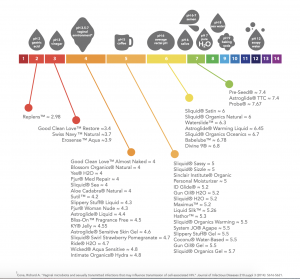
Osmolality
One of the biggest concerns with water based lube is osmolality. Do you remember studying osmosis in high school biology? Yeah, I didn’t really remember much about it either. But this is what is means.
Osmosis is a process in which molecules of a solvent tend to pass through a semipermeable membrane from a less concentrated solution into a more concentrated one, thus equalizing the concentrations on each side of the membrane.
So, with water-based lube you want to find one that has about the same osmolality as the mucous membranes in the body, otherwise it will either put too much water into the tissues or take water out of the tissues.
If there are lubes that put too much water into the cells, this can cause them to rupture. This one was a big eye-opener for me. Two of the top water-based lubes do this. And when I’m talking about cells, I’m also talking about sperm. These lubes can actually cause sperm to explode. Think about what that can mean for your fertility? You may be trying to have a baby and using one of these lubes and it’s making the sperm explode.
There are also lubes that take water out of the body and dehydrate it and can cause the entire wall of the vagina to slough off. And this isn’t something you can see with the naked eye. You aren’t going to be aware of this. But it’s probably going to cause problems like burning and irritation. You aren’t going to be as protected from infection. It’s really not good!
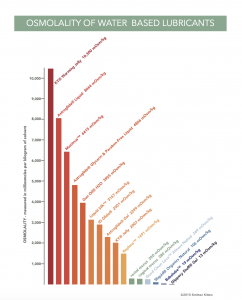
Oil based lube
Oil based lubes provide lots of moisture and are longer lasting than water-based. They are safe to use with all non-toxic sex toy materials. But, oil based lubes are NOT compatible with most safer sex barriers, so do not use oil based lubes with latex or polyisoprene condoms. You also don’t want to use any oil based lube that isn’t plant based inside the body. A lot of oil based lubes are petroleum based which you shouldn’t use inside the body because it can breed bacteria. A lot of people like coconut oil because it’s readily available. It can be great but dries fairly quickly. One thing to note with oil based lubes is that it usually takes longer to clear out of the body than other types of lubricants, so it is not recommended for people who experience chronic, recurring vaginosis, UTI’s, or yeast overgrowth.
Silicone based lube
Silicone based lube is the best overall type that works for most people. It’s newer so it’s not as readily available at convenience or grocery stores, but it is becoming more and more available from different companies. Silicone lube is hypoallergenic as it doesn’t typically soak into the skin and doesn’t need preservatives. It lasts longer than any other type of lubricant and isn’t water-soluble, so it’s great for play in the shower or bath. It is compatible with all safer sex barrier methods and it is what is used on almost all pre-lubricated condoms. It is recommended to choose one that has 4-6 or less ingredients. Silicone based lube is not good to use with silicone sex toys because it can change the texture of your toy. So be careful with that.
Hybrid (Silicone & Water)
This hybrid lube is less likely to cause irritation than water-based lube but isn’t regarded as hypoallergenic. It lasts longer than water-based but not as long as silicone based. It is compatible with sex toys and safer sex barrier methods. It is a newer product with less information available and less general availability outside of speciality stores.
Added ingredients
So now that we’ve talked about all the different types of lubes, I wanted to share with you some ingredients in lubes to watch out for. Every body is different and may have different sensitivities or allergies, so it’s important to read the list of ingredients before putting lube on your body. There are a few ingredients that are bad for MOST bodies, and should generally be avoided.
- Glycerin(e) – you may recognize this one as a sugar alcohol. It is anecdotally been linked with yeast overgrowth and is very hyper-osmotic meaning it dehydrates the tissues.
- Propylene Glycol – this is a chemical derived from petroleum. It is a sensitizer, meaning the more you are exposed to it, the more likely you are going to have an allergic reaction to it. It is also hyper-osmotic, meaning it dehydrates the tissues.
- Nonoxynol 9 & Chlorhexidine Gluconate – Both are designed to kill microbes in an effort to make them sterile or antiseptic but it also kills healthy bacteria and compromises cell integrity. These ingredients can lead to burning or stinging sensations and leave the body more susceptible to STI and pathogen transmission for 24-27 hours.
- Petroleum Oils – These oils are breeding grounds for bacteria and take a long time to be cleared from inside the body.
- Polyquaternium-15 – this is used as a preservative but it can enhance viral activity and infectivity of HIV and similar viruses, so it should be avoided where STI contraction or transmission is possible.
- Benzocaine – is a numbing ingredient and skin irritant. Numbing lubes can be used responsibly, but listen to the body’s pain responses.
- Sugars – some lubes use sugars like glucose, honey, or maltodextrin for flavor. These ingredients can feed yeast. They can also dry sticky or tacky which causes more friction. Lubes with sugar can be used for external use, but not recommended for internal use.
- Menthol – you’ll see this a lot on lubes that offer “Warming sensations”. Menthol is like putting icy-hot on your genitals. Not recommended!
A few last thoughts about lube…
- Not all lubes work well for all purposes, so you’ll want to find lubes that work well for the purpose you want them for. And you might need different lubes for different types of activity.
- If you are wanting to do anal play, you’ll want something thicker. There are lubes specifically for this purpose.
- A sex shop is a great place to find lubes. They will have many that aren’t available at the grocery store and often have testers so you can test how they feel and their consistency. You can also purchase online.
- Your doctor is probably not educated on lube. They may recommend the big name brands just because that is what they know. KY is a lot like surgi-lube which is a sterile lubricant that is used in hospitals for a variety of things. It’s water-based and contains some of the ingredients I talked about before. It’s really good for things like inserting a catheter, but it really isn’t great for personal use. This is most likely the lube at your doctor’s office, so I suggest taking your own lube when you go in for your annual exams.
If you are wanting to try some new lubes, my personal favorite is Coconu. If you use the code Amanda at checkout, you will receive 15% off. I also like Sliquid, they have a variety pack on amazon that lets you try all their different lubes and the little packs are great to take on trips because you don’t worry about them spilling. I’ve heard great things about Uberlube. I’ve heard Sutil is recommended if you have had a decrease in estrogen levels, either with menopause or breastfeeding. A couple of other recommended brands are Aloe Cadabra, Waterslide, YES, and The Butters.
But really, you’ve got to find one that is right for you. So try a bunch and see what works. I hope this episode has been informative and eye-opening.
Links may contain affiliate links.




How do you know the osmolality of the mucous membranes?
It shows it on the Osmoality chart above.
Rectal Mucus 290mOsm/kg
Vaginal Mucus 280mOsm/kg